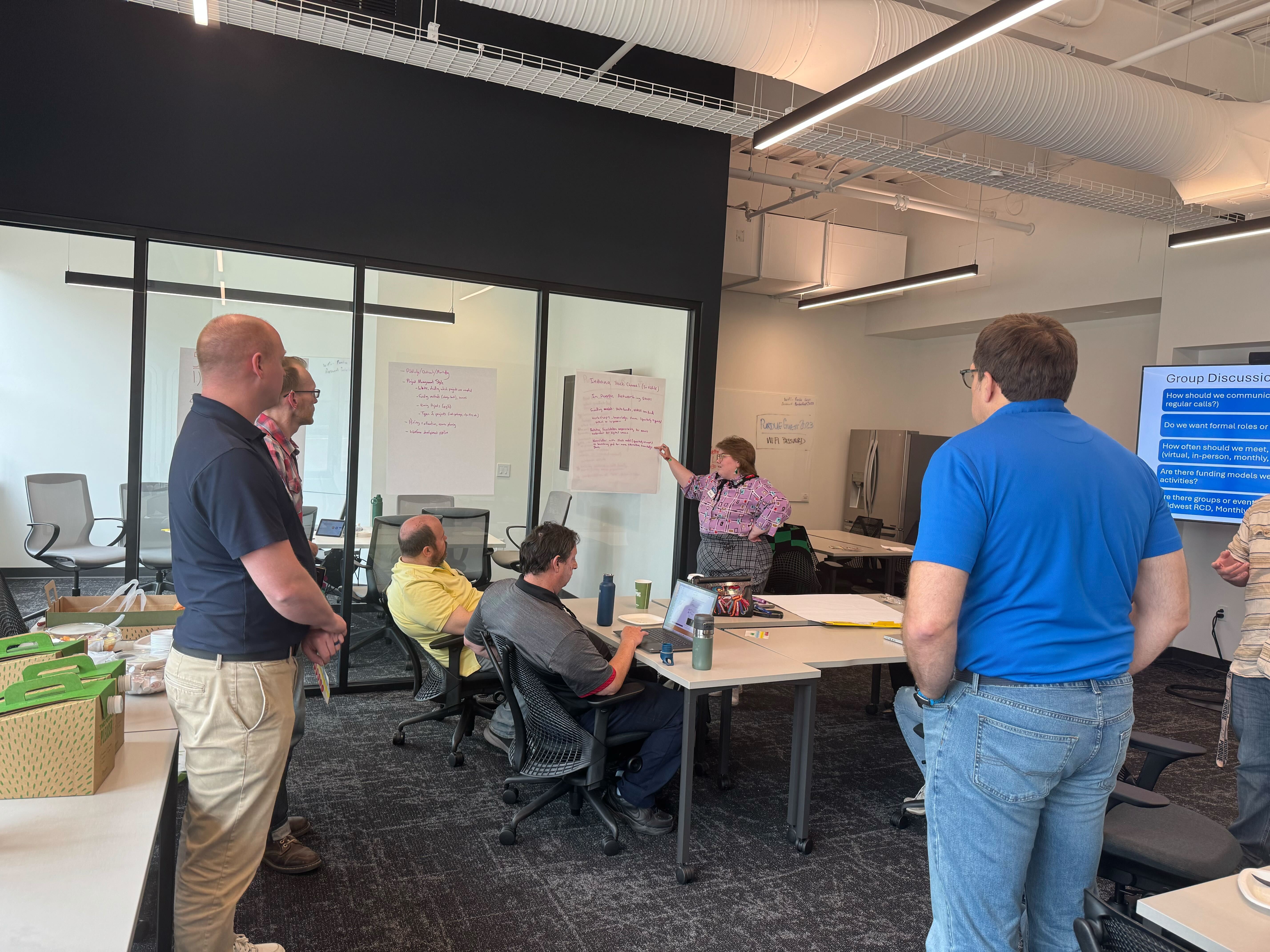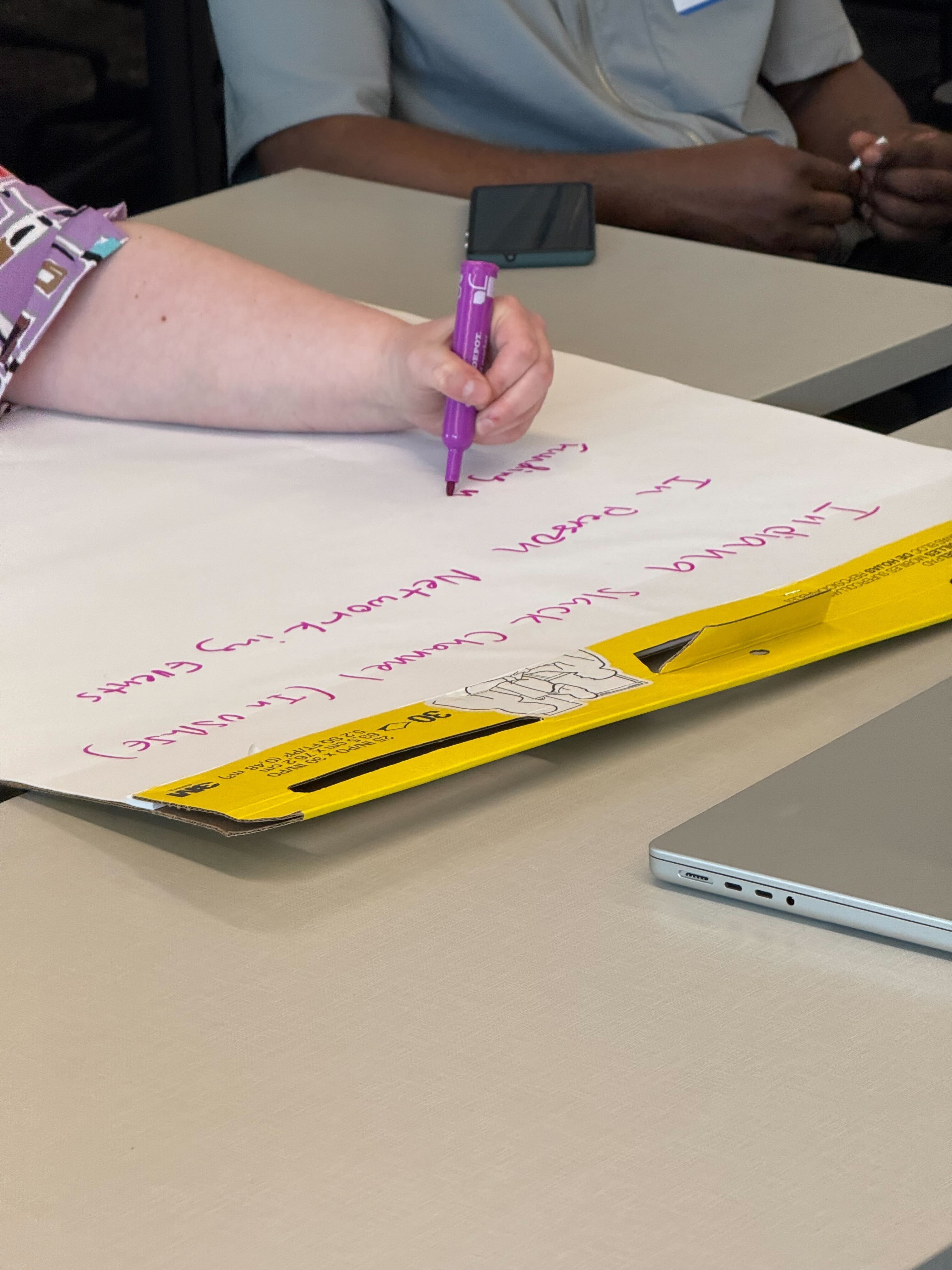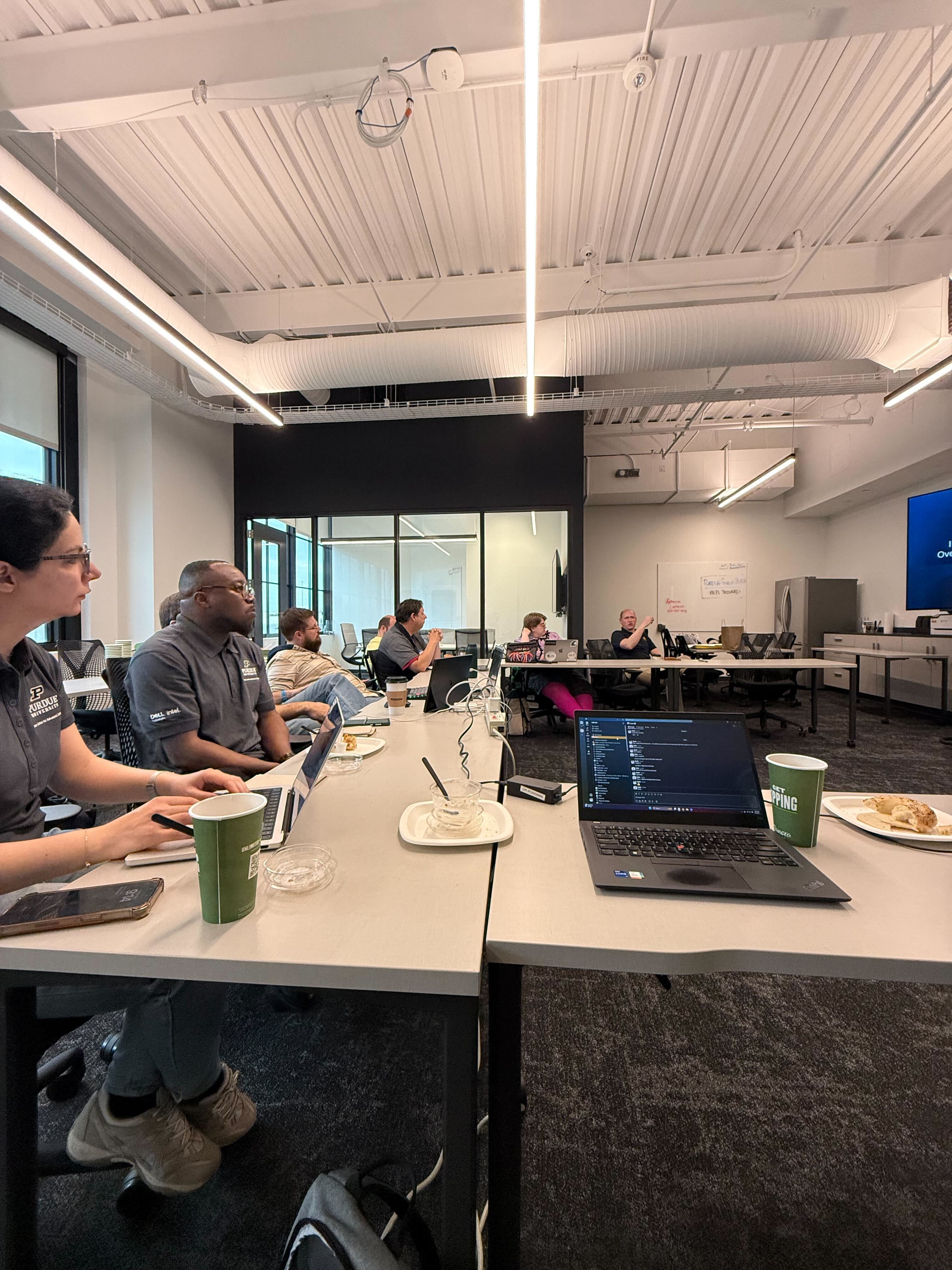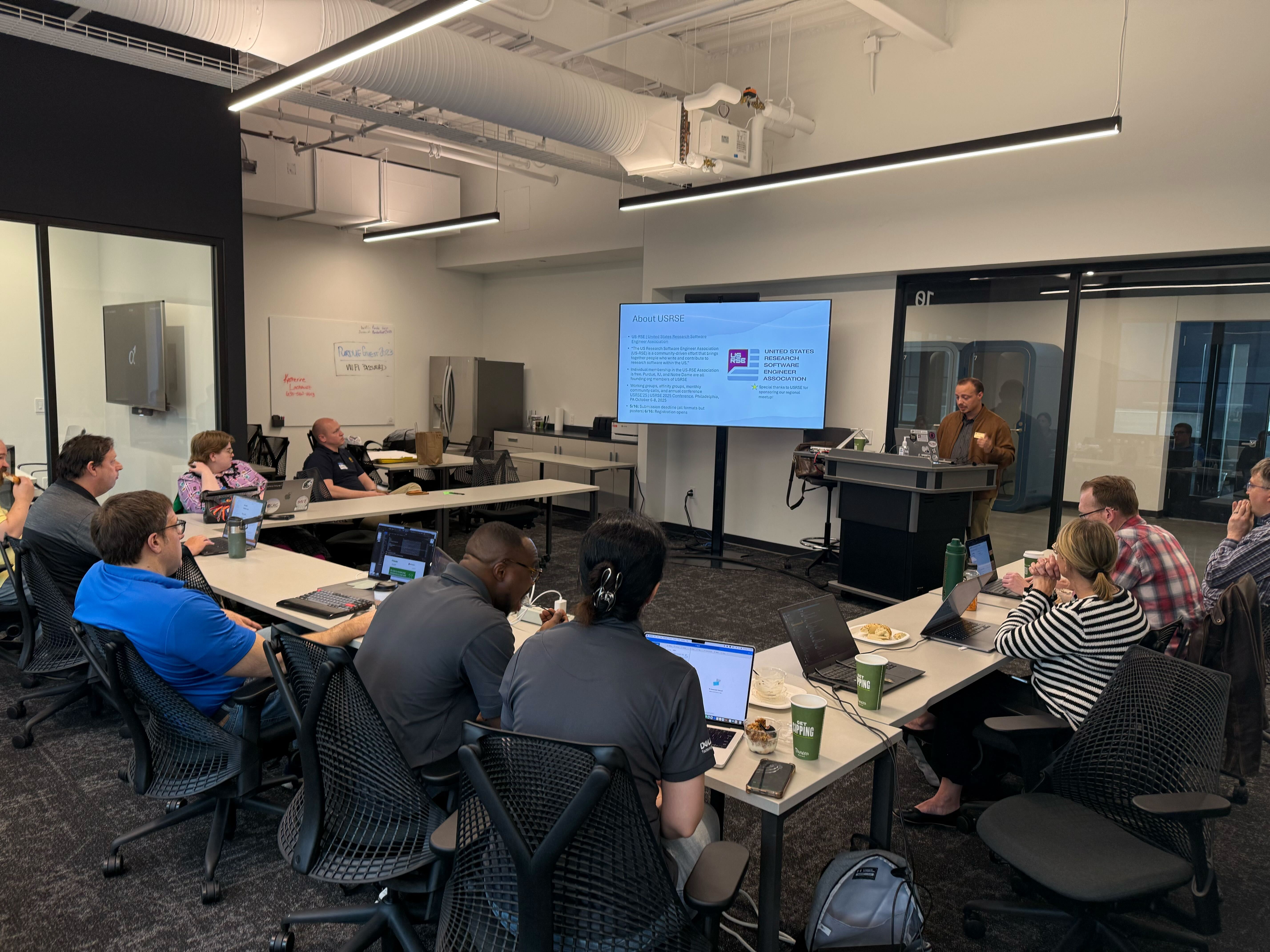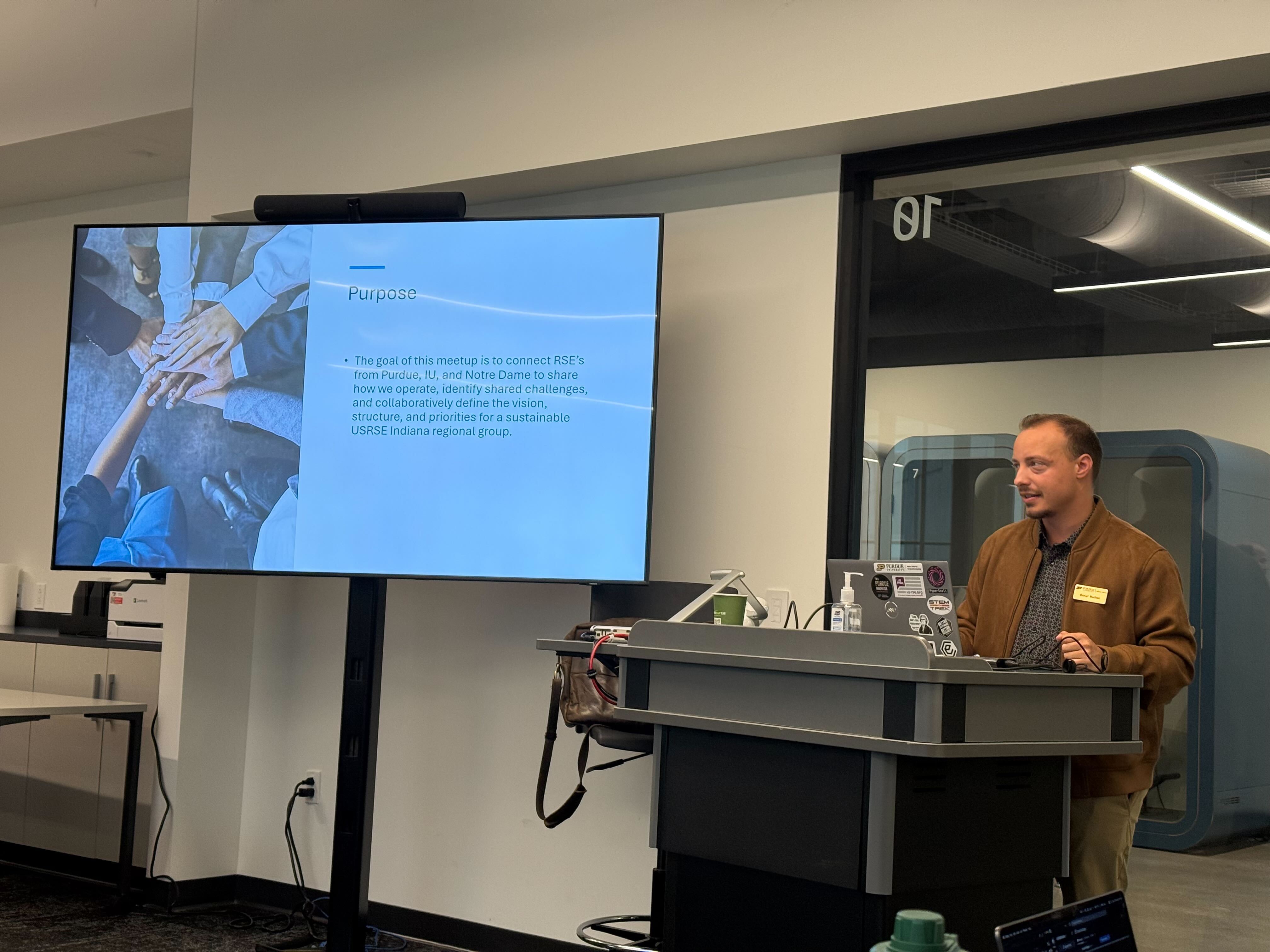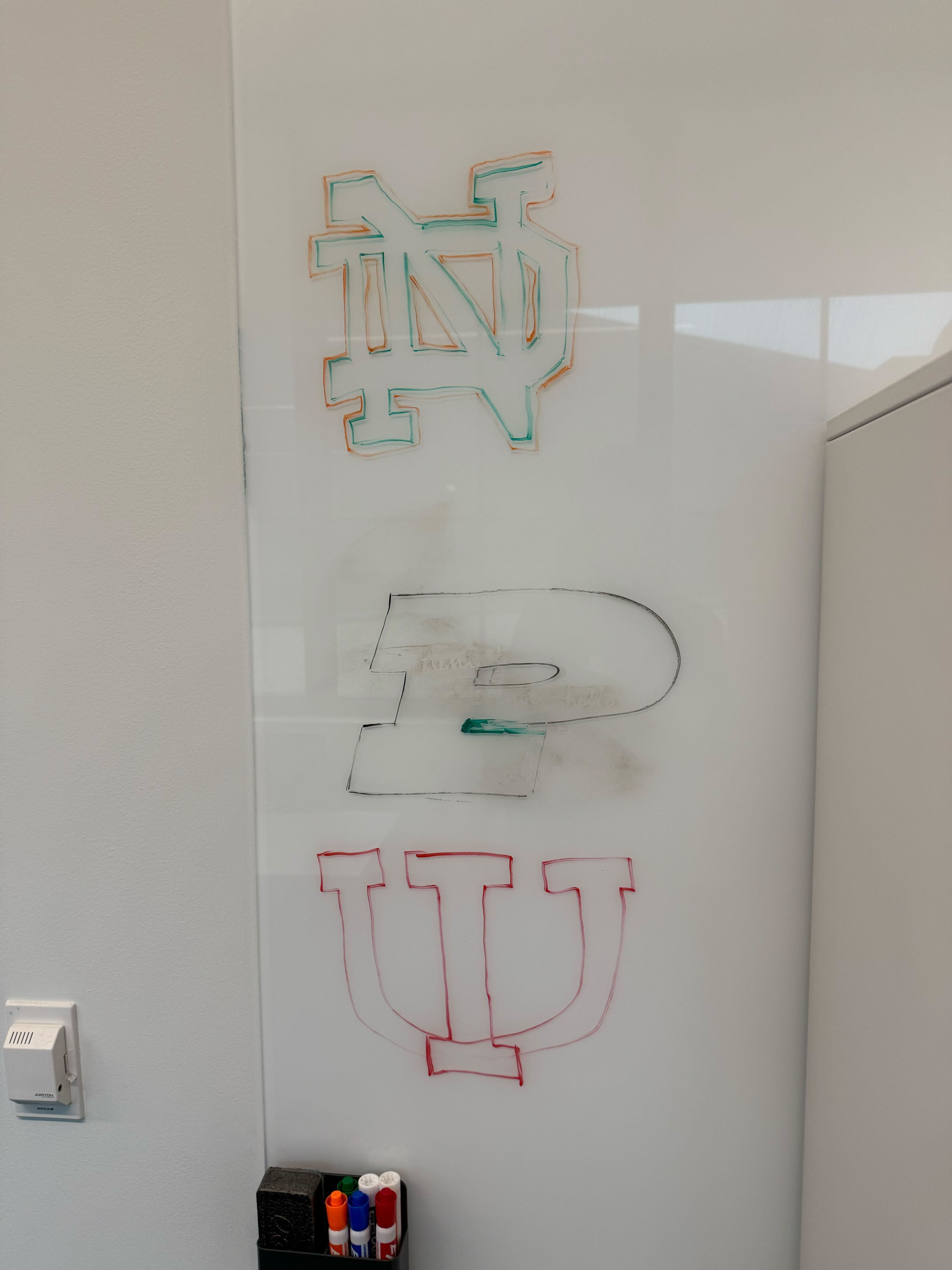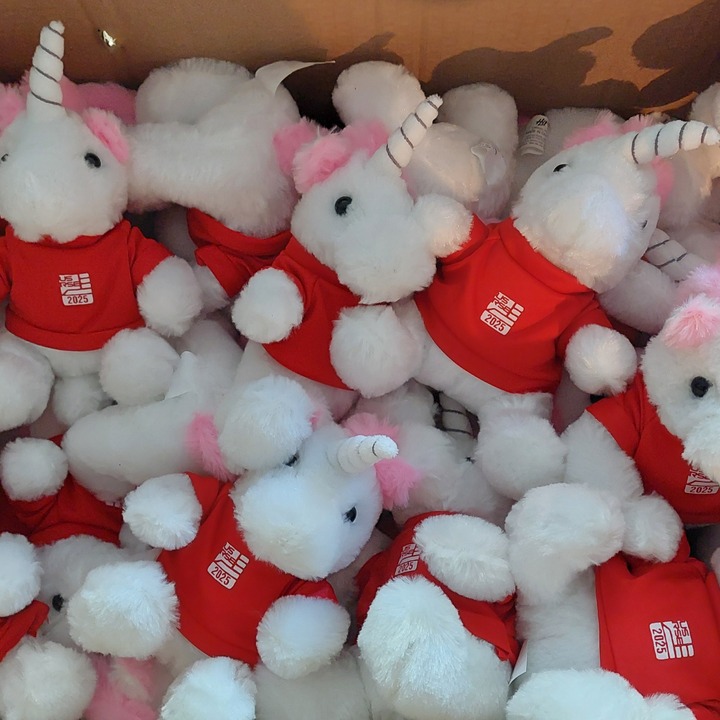US-RSE May 2025 Newsletter
👯 This Month: Meetups! 👯
Published: May 28, 2025 by Tinashe M. Tapera
In this monthly newsletter, we share recent, current, and planned activities of the US-RSE Association, and related news that we think is of interest to US-RSE members. Newsletters are also available on our website. To receive our newsletter, join US-RSE.
This month, we’re highlighting the importance and impact of meetups in our community!

Meetups are a great way to connect with fellow Research Software Engineers, share knowledge, and build relationships. Whether you’re interested in discussing best practices, collaborating on projects, or networking and making friends, meetups provide a valuable platform for engagement. Read on to hear about how our members are using meetups to connect with each other and the community at large.
In this issue:
- 1. USRSE’25 Conference
- 2. Meetups!
- 3. Steering Committee Updates
- 4. Organizational Founding Membership
- 5. Community and Travel Funds
- 6. Community News
- 7. Interesting Events and Opportunities
- 8. Featured Reads, Videos, or Podcasts
- 9. Get Involved
- 10. Recent Job Postings
🔔 1. US-RSE Conference 2025 (USRSE’25)

Are you making plans to join us in 🦅 Philadelphia, Pennsylvania 🦅 October 6-8, 2025? The theme for the third annual conference from the United States Research Software Engineer Association (US-RSE) is “Code, Practices, and People.”
The conference organizers are pleased to share that we received many high quality submissions to the upcoming conference. Thank you to all who submitted your work! Reviews are underway and notifications should be sent by July 14. Registration will open in June.
While the submission deadline for most formats has passed, we continue to invite poster submissions for USRSE’25. Poster submissions will be accepted through July 20, 2025.
Whether you’re a research software engineer, data scientist, digital humanist, scientific programmer, software developer, or research software user, US-RSE is where people at the intersection of code and research come together. The USRSE’25 conference is your chance to connect with peers, mentors, and experts in the fast-growing world of research software. Don’t just take our word for it—100% of last year’s post-conference survey respondents said they would return and recommend the conference to others.
Visit the conference website for further details including:
- Venue, hotel, and travel details
- Posters: how and where to submit (still have questions? contact usrse2025@easychair.org)
- Dates for notification of acceptance and other important dates
👯 2. Meetups! How RSE’s Connect 👯
Meetups are a vital part of any community, and US-RSE is no exception. They provide a space for our members to connect, share ideas, and collaborate on projects. This month, we want to highlight some of the recent meetups that have taken place in our community.
DMV Regional Group
The DC/Maryland/Virginia Regional Group (RG-DMV) hosts formal and informal gatherings every 2–3 months, offering professionals a chance to learn from and inspire each other. In January, they held a meetup focused on career development in research software engineering.
The event featured Dr. Angeline Burrell, a research physicist at the Naval Research Laboratory, who led a conversation on writing effective recommendation letters, publishing research code for impact, and incentivizing code and data sharing in grant applications — and, of course, featured pizza!
“A half-hour presentation led to about an hour of rich discussion and experience-sharing among RSEs from diverse research environments,” said one attendee, summarizing the value of the event. “Just what this meetup is supposed to do!”
Between formal events, the #rg-dmv-rse channel on Slack can often be heard buzzing away actively as they plan, attend, and chat about in-person social events they host across the region.
Indiana Regional Group
But what if there’s no meetup in my locale? you may be asking. Well, starting one himself is exactly what Daniel Madren did for local Hoosier-RSEs in the Indianapolis area. In April 2025, Daniel organized the first Indiana Regional Group meetup, bringing together RSEs from Indiana University, Purdue, and Notre Dame.
“We wanted to better understand how each of our teams operate,” he said. “And how we might build something more intentional: a sustainable, connected US-RSE Indiana Regional Group.”
The group kicked off with introductions, then dove into a breakout session with sticky notes, easel pads, and big ideas for future networking strategies. Some ideas included regular meetups and knowledge-sharing events; establishing regional support networks; and emphasizing more in-person collaboration at existing conferences and symposiums.
Wondering how to get started? Daniel’s advice is to just start! “The US-RSE Community Funds program helps break down the barriers of institutional silos. [And,] because of the travel support, folks from Notre Dame and IU could take part in Purdue’s 2025 Research Computing Cyberinfrastructure Symposium, attend the RSE meetup, and build relationships all in one trip.” By colocating events and taking initiative, the group maximized their time and laid the foundation for future collaboration on a modest budget.
🎉 Big thanks and congratulations to Daniel and the Indiana and DMV Regional Groups for sharing their stories! You can read Daniel’s full report here. Would you like to learn more about organizing a meetup? Check out our Forming US-RSE Affinity Groups guide, and don’t miss the Community Funds section below to see how US-RSE can support your next event.
🛞 3. Steering Committee Updates
In May, the Steering Committee continued advancing priorities identified during our earlier strategic planning efforts. A newly formed subcommittee began reviewing Steering Committee eligibility criteria, election procedures, and the potential introduction of appointed roles to better support the evolving organization. With the changing federal funding and policy landscape affecting many RSEs, we also discussed whether and how US-RSE should respond, and what role we might play in supporting the community through these changes. Jointly with our Executive Director, we mapped out key initial tasks, goals, and priorities for a new Community Manager. Finally, we began early planning discussions for the USRSE’26 conference.
🤝 4. Organizational Founding Membership
US-RSE envisions a future where Research Software Engineers are universally respected for advancing science, technology, and society through the transformative power of research software engineering. We’re excited to share that the momentum around our Organizational Founding Membership continues to grow! Our current members are listed below, and organizations that join on or before November 30, 2025, will be recognized in perpetuity as founding members. Founding organizations will also lock in current membership fees through December 31, 2028. Organizational support helps sustain and expand vital community offerings, including the annual conference, monthly calls and newsletter, job board, working groups, and new resources.
Please reach out to Sandra Gesing at sandra@us-rse.org if you are interested in becoming an organizational founding member!
Premier Members
Standard Members
Basic Members
✈️ 4. Community and Travel Funds program
Part of the Alfred P. Sloan Foundation grant for US-RSE has been delegated for the Community and Travel Funds program. Members of US-RSE can apply for funds for community or individual purposes for event costs, get-togethers, travel funding, and more.
The next application deadline is March 31, 2026. We encourage you to apply for funding to support your community and travel needs!
The application process is simple and straightforward. You can find the application form here.
🗞️ 6. Community News
Community Calls
The next community call topic will be on AI in Research Software Engineering and will take place on June 13th at 1PM CDT/2PM EST. Please visit the Community Calls Website for more information and to access the registration link.
It’s been almost two years since we lasted talked about AI, ChatGPT, and LLMs in RSEng, and a lot has changed in that time! Let’s get together and share how we’re using these tools today to write code, check code, or otherwise help out in our roles as RSEs. What do they mean for our job? How are they best deployed? Do they create trustworthy code? Or maybe you use them for research rather than for creating code for research? What do they mean for the next generation of research software engineers? These and so many more questions will be discussed at our next community call.
May Community Call (Past)
The May Community Call was about the upcoming USRSE’25 Conference, and is available on YouTube:
👀 7. Interesting Events and Opportunities
🦄 They Arrived as a Herd… But They’re Ready to Travel to You! 🚀
The 2025 US-RSE magical unicorns have officially arrived!
👉 https://give.communityin.org/unicorn2025?ref=ab_20w0PysS59P20w0PysS59P
🚀 Supercomputing and the Future of AI: Watch the Full Virtual Exchange Series On-Demand! 🤖
Our exciting webinar series for K–12 classrooms, presented in partnership with Reach the World, has officially wrapped! Over the past ten weeks, more than 840 students joined us to explore the fascinating world of supercomputing, quantum computing, and artificial intelligence. Now, all episodes are available to watch on-demand along with companion journal articles that bring the topics to life for students, educators, and curious minds of all ages. Together with Reach the World, US-RSE created this virtual exchange to offer a behind-the-scenes look at how research software engineers and data scientists use cutting-edge computing to tackle real-world challenges.
Learn more at ReachTheWorld.org, and please reach out to Sandra Gesing with any questions
🚀 Code Review Study
Dr. Jeffrey Carver, Dr. Nasir Eisty, and Md Ariful Malik from the University of Alabama are conducting a study to explore the code review process used by Research Software Engineers (RSEs).
As an RSE, we invite you to participate in an interview to share your experiences with the code review process. The interview will take approximately 15–20 minutes and can be conducted via Zoom or in person, depending on your preference.
Your participation is completely voluntary and confidential. Information will be kept anonymous, and with your approval, we will record the audio of the interview. Any personal information will be deleted after the interview. You may choose to withdraw at any time before or during the interview. To be eligible, you must be 18 years or older. This study has been approved by the University of Alabama Institutional Review Board.
We would greatly appreciate your participation and insights. Thank you in advance! If you are interested in being interviewed, please fill out this short information form so we can contact you to schedule an interview.
🚀 Open Innovation Sprint
Research software is the engine driving modern science and discovery. From analyzing complex datasets to simulating intricate phenomena, it’s an indispensable part of the research lifecycle. Yet, understanding and quantifying its impact remains a significant challenge for researchers, project contributors, institutions, and funders alike.
How do we effectively measure the reach and influence of these vital tools? How can we incentivize better practices around software citation, metadata, and sustainability?
To tackle these shared ecosystem challenges head-on, NumFOCUS’s Open Source Science Initiative launched the 2025 “Impact of Research Software” Open Innovation Sprint!
Running from March through late 2025, this sprint is a collaborative, fast-paced initiative bringing together researchers, engineers, designers, community organizers, and users. Our goal is to produce actionable, community-driven outputs – open source tools ready for immediate use and contribution.
This inaugural sprint, focused on measuring research software impact, is inspired by efforts such as the CZI 2023 Software Impact Hackathon, is led by NumFOCUS’s Open Source Science Initiative, and is made possible through collaboration with the Research Software Alliance (ReSA), Open Source Collective and ecosyste.ms, and the Sprint’s contributors and their organizations.
🚀 R-RSE Affinity Group (Project 2)
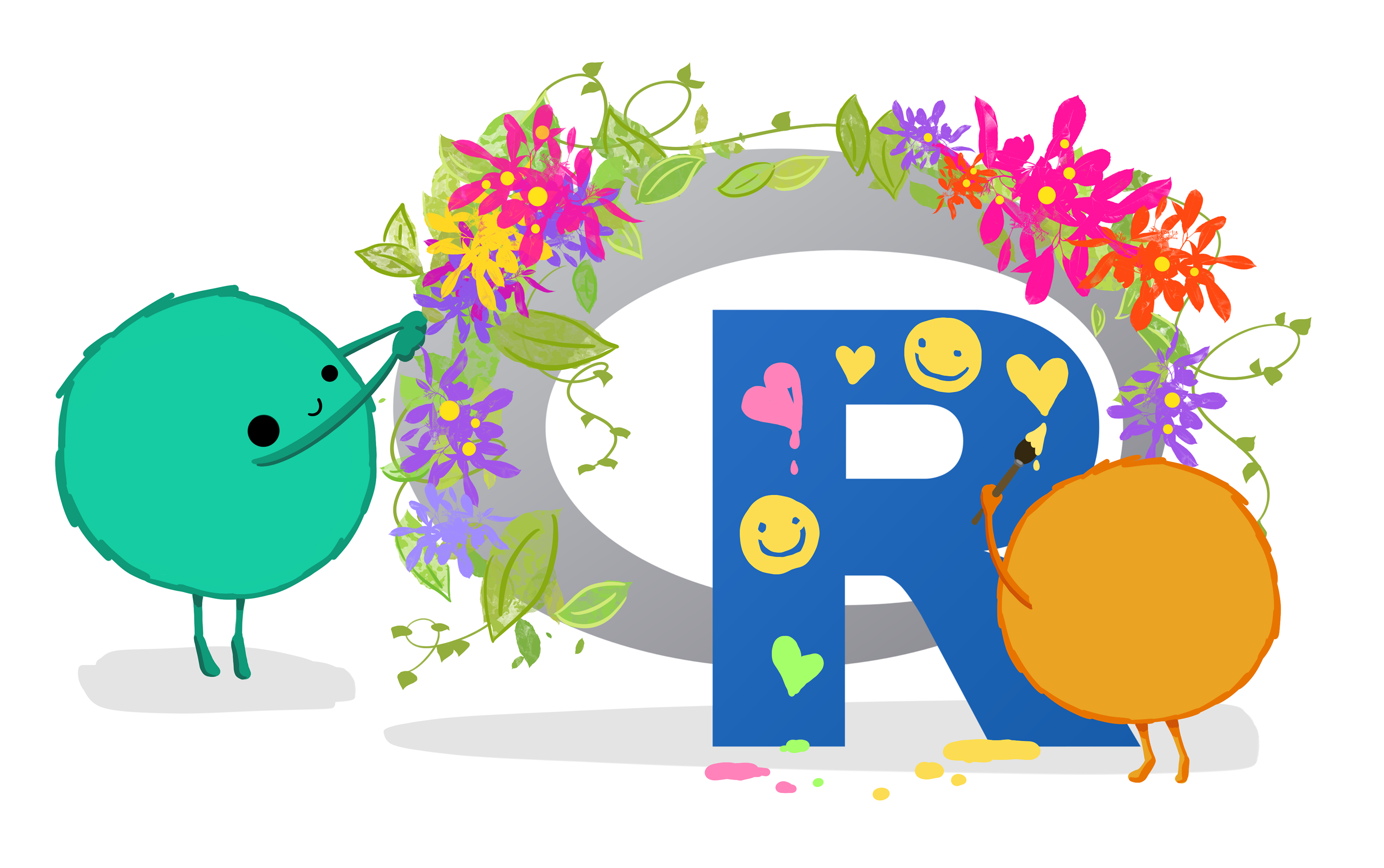
Interested in designing and launching a mini-hackathon, codeathon, or other R-focused project?
Come join the R-RSE Affinity Group (R-RSE) for Project 2 of 3 that we are making available this year! R-RSE exists to increase the representation of R users in the US-RSE community and provide opportunities for members to develop R skills.
Submit your plan by June 6, 2025. More details can be found here!
🚀 Call for Papers: AI4Dev Workshop on AI-Assisted Software Development for HPC
Are you working at the intersection of AI and high-performance computing (HPC) software development? Submit your work to the AI4Dev Workshop, part of ICPP 2025!
This workshop invites original research on how AI and machine learning can assist the full software development lifecycle in HPC environments—from code generation and optimization to debugging, testing, and deployment.
Topics of interest include (but are not limited to):
- AI/ML for programming productivity and code generation
- Performance analysis, debugging, and testing driven by AI
- Compiler optimizations, auto-tuning, and IDE extensions
- Code maintainability, deployment, and security tools powered by AI
Accepted papers will be presented at the workshop alongside invited talks from leaders in the field.
📅 Key Dates:
- Paper Submission: June 17, 2025
- Notification: July 08, 2025
- Camera Ready: July 22, 2025
- Workshop: September 8, 2025
🚀 Rapid Response Bridge Grants for NSF-Funded Education Research Projects
Has your NSF-funded education research project been unexpectedly cancelled?
In response to recent abrupt shifts in federal funding—including the termination of active NSF research grants—The Kapor Foundation, The William T. Grant Foundation, and The Alfred P. Sloan Foundation have partnered to offer $25,000 rapid response bridge grants.
These grants aim to help scholars and research teams address immediate needs such as:
- Completing a round of data collection or analysis
- Thoughtfully closing out community-based work
- Writing papers or proposals to continue the project
Eligibility:
- Must be working in STEM and education research (including AI, CS, MSIs, graduate education, or equity-focused work)
- Must have had a recent NSF grant terminated or cancelled
- Early-career scholars will be prioritized where possible
- Due dates are May 30 and June 13, 2025
📢 Hawaii International Conference on System Sciences (HICSS)
📅 When: June 15, 2025 - Paper Submission Deadline
📍 Where: Hyatt Regency, Maui, HI
HICSS 2025
The 59th Hawaii International Conference on System Sciences (HICSS) will take place at Hyatt Regency, Maui, HI, on January 6-9, 2026. The deadline for submissions is June 15, 2025. Minitracks of interest include:
- Software Sustainability: Research on Usability, Maintainability, and Reproducibility
- Impact of AI on Software Engineering
Find out more about the conference and submit your paper at HICSS 2025.
📢 Social Coworking and Office Hours: Research Software Engineering and R
📅 When: Tuesday, July 1, 2025, 16:00–18:00 UTC
📍 Where: Online, 🌐
Join us for 2 hours of coworking and conversation on the first Tuesday of the month! This session focuses on Research Software Engineering and R, hosted by Saranjeet Kaur Bhogal, Research Software Engineer at Imperial College London and advocate for Open Science and Communities of Practice.
Come for the full session or drop in as needed!
Cowork:
- Catch up on your R work
- Plan or polish that package you’ve been meaning to build
- Work independently or alongside others
Socialize & Network:
- Meet other R users and rOpenSci staff
- Ask questions, share best practices, and get support
- Discuss what it means to be an R-focused Research Software Engineer
Join us on Zoom to cowork, connect, and share! Register or join the event
📢 Automating Scientific Insights at the Advanced Photon Source
📅 When: June 11, 2025, 11:00–11:30 AM PST / 2:00–2:30 PM EST / 20:00–20:30 CEST
📍 Where: Online Talk
Join Hannah Parraga from Argonne National Laboratory for a focused talk on high-performance workflows for experimental data analysis at the Advanced Photon Source.
Learn how reusable workflows are simplifying data processing across beamlines by harnessing the computational power of HPC systems at ALCF and NERSC. These automated, accessible tools boost productivity, facilitate collaboration, and let researchers concentrate on what matters most: scientific discovery.
Don’t miss this quick and insightful session! Learn more and register
📢 ACM Austin Kickoff: Lightning Talks & Tech Social
📅 When: Thursday, June 12, 7:00 PM–9:00 PM CDT
📍 Where: Austin, TX (venue TBA)
Join us for the first official event of ACM Austin, a new community for students, developers, researchers, and tech leaders passionate about computing and innovation. Whether you want to learn, connect, or contribute, this event is for you.
Agenda Highlights
-
🎤 AI Agents vs. Agentic AI – Rajesh Govindarajan
Understand the difference between standard LLM wrappers and truly agentic architectures. -
🎤 Secure-by-Design AI Agents – Hariharan Ragothaman
Explore open-source tools like LangChain, Trivy, and Semgrep to build adaptive DevSecOps workflows. -
🎤 AI & You: Amplifying Your Potential – Sammy Cheung
Discover how to strategically grow your career with AI as your co-pilot.
We’ll also share opportunities to get involved as a speaker, volunteer, or supporter. ACM Austin is a non-profit ACM chapter dedicated to growing a strong, inclusive tech community in Austin.
Show up and get inspired! RSVP and event details here. Want to help shape the future of ACM Austin? Reach out to volunteer or sponsor.
📢 Practice and Experience in Advanced Research Computing (PEARC) 25: The Premier Research Computing and Data Conference
📅 When: July 20–24, 2025
📍 Where: Columbus, OH
Is PEARC25 right for you and your team? Whether research computing and data (RCD) is your primary focus or one aspect of your role, PEARC25 has something valuable to offer. This conference brings together professionals and students from emerging programs to well-established research centers.
Why attend?
- 🤝 Connect & Collaborate with RCD peers from universities and research institutions
- 💡 Develop Your Expertise through hands-on tutorials and real-world case studies
- 🚀 Explore Key Topics like AI in research, cloud integration, scientific workflows, software engineering, and data management
PEARC25 offers a high-quality, practical, and cost-effective experience — with all workshops and tutorials included in your registration. Whether you’re looking to deepen your technical skills or shape the future of RCD, this is the place to be.
Conference Highlights:
- Keynote Speakers: Distinguished experts in advanced computing and data science will share groundbreaking insights and future directions
- Technical Program: Over 100 presentations, workshops, and tutorials covering the latest advancements in research computing with all workshops and tutorials included in the registration fee
- Networking Opportunities: Connect with hundreds of professionals from academia, government, and industry
- Professional Development: Hands-on workshops and training sessions to enhance your technical skills
- Student Program: Special sessions and mentoring opportunities for students and early career professionals
Ready to join the RCD community at PEARC25? Register now or learn more here!
📢 Gateways 2025 Annual Conference
📅 When: Tuesday, October 28 – Thursday, October 30, 2025
📍 Where: The Oneida Hotel, Green Bay, Wisconsin
Gateways 2025 bridges the connection between science and gateways, bringing together developers, researchers, and users to learn, share, and collaborate. Hosted annually in the U.S., the conference features a robust program of keynotes, short papers, panels, posters, tutorials, demos, and open access proceedings.
This year’s event will also offer a special journal publication opportunity for all accepted papers.
Whether you’re a seasoned gateway developer or just getting started, Gateways is a great way to expand your skills and network in a welcoming, interdisciplinary environment.
Presentation and Publication Options We invite the submission of papers and abstracts related to science gateways. All contributions will be subject to standard peer review on quality and relevance. This will apply to tutorial sessions, papers, panels, posters, demos, and BYOP (Bring Your Own Portal). Tutorial sessions, papers, panels, posters, and demos will be published openly accessible in Zenodo. Please note that authors of papers will be invited to submit an extended and updated version of their paper for a special issue journal on science gateways.
- Tutorial submissions are due June 16, 2025.
- Paper, demo, and panel submissions are due June 16, 2025.
- Poster and BYOP - Bring Your Own Portal submissions are due August 4, 2025.
Learn more and get involved. Want to help shape the event? Email help@sciencegateways.org to join the planning committee.
📢 Advancing a Modernized Biomedical Data Ecosystem
📅 When: Thursday, June 5, 2025, 11:00 AM – 12:30 PM CDT
📍 Where: Online Webinar
Join Ishwar Chandramouliswaran, Lead Program Director at NIH’s Office of Data Science Strategy, for a deep dive into the FAIR Data and Resources Unit’s strategy to modernize the biomedical data ecosystem. This webinar will highlight how NIH is driving the adoption of FAIR principles and supporting sustainable, open biomedical data practices.
Key Topics:
- Coordinating FAIR (Findable, Accessible, Interoperable, Reusable) data practices across NIH
- Supporting repositories, knowledge bases, and open software development
- Promoting software reusability and sustainability
- Building partnerships to enhance FAIR education and implementation
This 90-minute session includes a 1-hour presentation followed by a 30-minute Q&A. Come explore opportunities for collaboration and learn how you can advance FAIR practices in your work.
Register here and submit your questions for the Q&A. Please feel free to download the flyer and share it with colleagues and your professional network who might be interested!
📚 8. Featured Reads, Videos, and Podcasts
📑 Recent Publications
-
Y. Perez-Riverol, W. Bittremieux, W. S. Noble, L. Martens, A. Bilbao, M. R. Lazear, B. Grüning, D. S. Katz, M. J. MacCoss, C. Dai, J. K. Eng, R. Bouwmeester, M. R. Shortreed, E. Audain, T. Sachsenberg, J. Van Goey, G. Wallmann, B. Wen, L. Käll, W. E. Fondrie, “Open-Source and FAIR Research Software for Proteomics,” Journal of Proteome Research, Vol. 24, No. 5, pp. 2222–2234, 2025. Read the article.
-
R. Littauer, G. Wilson, J. Ainali, E. A. AlOmar, S. Arabas, Y. Bellini Saibene, K. Bubendorfer, K. Champion, C. Dillon, J. Helske, P. Huybrechts, D. S. Katz, C. Liao, D. Lippert, F. Liu, P. Marshall, D. R. McCloy, I. McInerney, M. W. Mkaouer, P. Ojha, C. Treude, E. P. White, “10 Quick Tips for Making Your Software Outlive Your Job,” arXiv preprint arXiv:2505.06484, 2025. Read the article.
-
P. V. Hernández Serrano, M. Barker, D. S. Katz, C. Martinez-Ortiz, H. Shanahan, “Identifying Gaps in Research Software Policy: A Report from Subgroup 3/4 of the ReSA & RDA Policies in Research Organisations for Research Software (PRO4RS) Working Group,” Research Software Alliance & Research Data Alliance, 2025. Read the report.
-
B. U. Westner, D. R. McCloy, E. Larson, A. Gramfort, D. S. Katz, A. M. Smith, A. Delorme, V. Litvak, S. Makeig, R. Oostenveld, J.-M. Schoffelen, T. M. Tierney, “Cycling on the Freeway: The Perilous State of Open-Source Neuroscience Software,” Imaging Neuroscience, Vol. 3, 2025. Read the article.
📝 Blog Posts
-
A. Mittal, “From Cloud Chaos to Developer Delight — A Practical Guide to Building Your First Internal Developer Platform,” Medium, May 19, 2025. Read the post.
-
S. Willison, “Building software on top of Large Language Models,” SiminWillison.net, May 15, 2025. Read the post.
🎧 Podcast Highlights
Recent episodes from the #code4thought podcast:
-
Let’s Go Atomic (with Design) – Brad Frost
Listen here -
Pandoc: A Swiss-Army Knife for Documents – with J. MacFarlane, A. Krewinkel
Listen here
Have something interesting you’d like to share? Please send us your suggestions for the next newsletter using the #newsletters channel in the USRSE Slack!
🏃 9. Get Involved
US-RSE Working Groups:
- Code Review
- Community Calls
- Diversity, Equity, and Inclusion
- Education and Training
- Group Management
- Mentorship Program
- Outreach
- RSE Empowerment in National Labs
- Testing
- User Experience
- Website
🧑💼 10. Recent Job Postings
These opportunities were recently posted to the RSE Opportunities page:
-
Scientific Applications Programmer
📍 Lynker, College Park, MD (remote possible)
🗓️ Posted: 2026-02-11 | Expires: 2026-04-30 -
Open Source Software Technology Program Developer
📍 Kitware, Inc, Clifton Park, NY
🗓️ Posted: 2026-02-09 | Expires: 2026-05-15 -
Senior Software Engineer
📍 Internet2, Remote
🗓️ Posted: 2026-01-28 | Expires: 2026-04-30 -
Research Software Engineer
📍 [C]Worthy, Boulder, CO
🗓️ Posted: 2026-01-18 | Expires: 2026-02-15 -
Data Science Engineer
📍 Lawrence Berkeley National Lab, Berkeley, CA
🗓️ Posted: 2026-01-07 | Expires: 2026-03-01 -
Lead Research Software Engineer
📍 Princeton University, Princeton, NJ
🗓️ Posted: 2026-01-06 | Expires: 2026-03-31 -
Lead Research Software Engineer
📍 Yale Center for Geospatial Solutions, Yale University, New Haven, CT (can be remote)
🗓️ Posted: 2025-12-10 | Expires: 2026-03-01 -
Research Engineer / Research Scientist
📍 Aeolus Labs, San Francisco, CA
🗓️ Posted: 2025-12-08 | Expires: 2026-04-30 -
Senior Manager, Research Software Engineering
📍 Rosen Center for Advanced Computing, Purdue University, West Lafayette, IN
🗓️ Posted: 2025-11-13 | Expires: 2026-02-27
Other Job Boards
- Research Software Engineering Opportunities in other associations/societies
- Software Carpentries Job Opportunities
- Academic Data Science Alliance Jobs
- High Performance Computing (HPC) Jobs from hpc.social
- SGX3 and SGCI Science Gateways Community Jobs Board
This newsletter is a joint effort of members of the US-RSE Association.
© US-RSE • 2021–2026 • US-RSE is a fiscally sponsored project of Community Initiatives
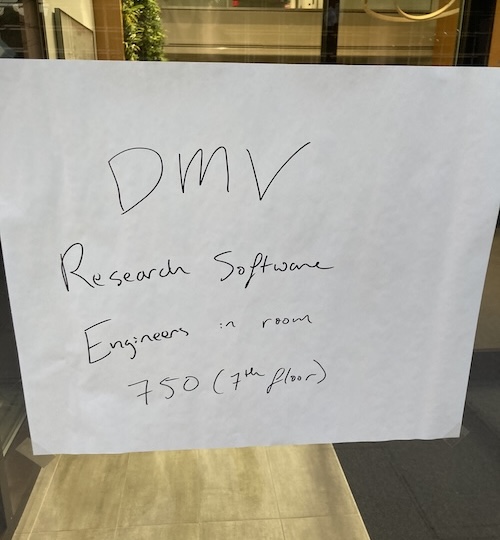
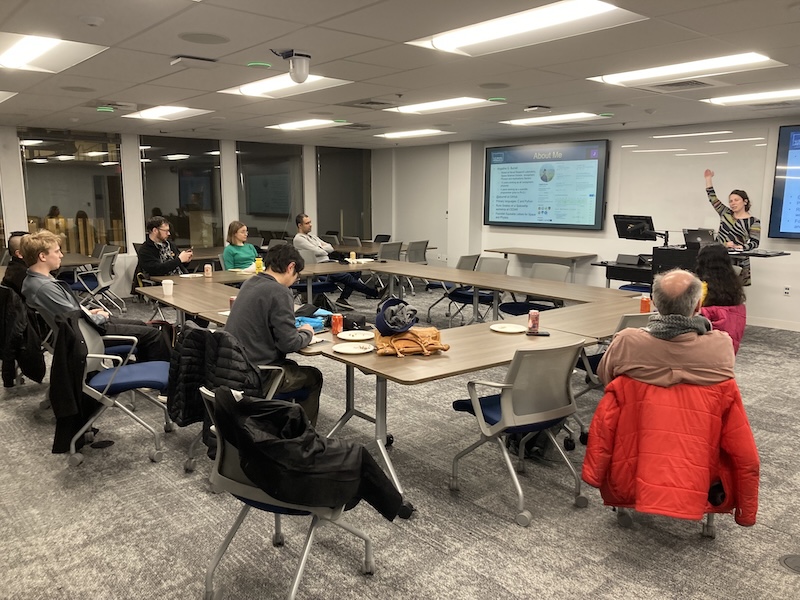
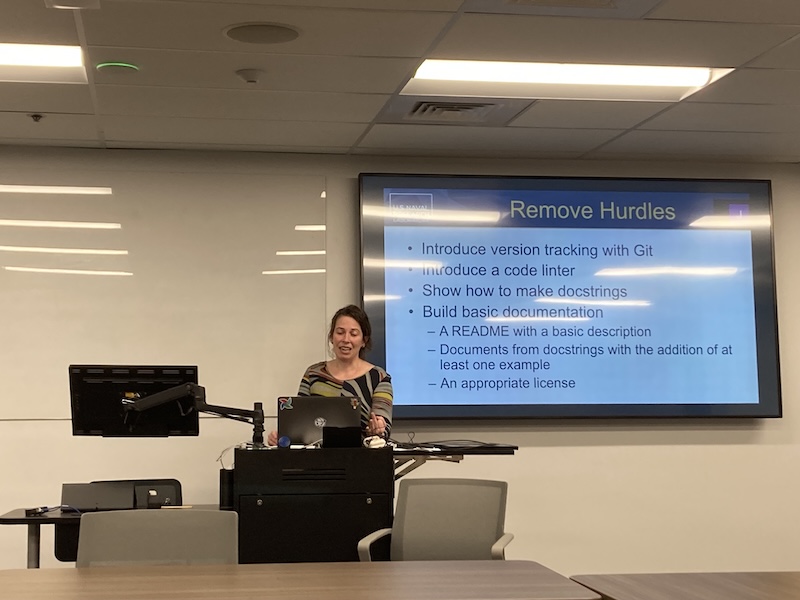
.jpg)
